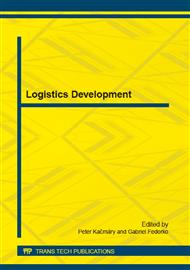[1]
R., Bednár, H. Vidová, M. Beluský, Lean principles application in business logistics, in: METAL 2012, 21st International Conference on Metallurgy and Materials. (2012).
Google Scholar
[2]
R. Bednár, N. Horňáková, H. Vidová, Implementation procedure of lean methods in logistics processes, METAL 2013 - 22nd International Conference on Metallurgy and Materials. (2013).
Google Scholar
[3]
A. Rosová, Logistics costs of an enterprise, Acta Montanistica Slovaca, 12 (2007) 121-127. (original in Slovak).
Google Scholar
[4]
M. Straka, The system of distribution logistics of the enterprise Alfa, a. s., Acta Montanistica Slovaca. 15 (2010) 34-43. (original in Slovak).
Google Scholar
[5]
A. Samolejová, J. Feliks, R. Lenort, P. Besta, A Hybrid Decision Support System for Iron Ore Supply, Metalurgija. 51 (2012) 91-93.
Google Scholar
[6]
M. Čambál, D. Cagáňová, J. Šujanová, The Industrial Enterprise Performance Increase through the Competency Model Application, 4th European Conferences on Intellectual Capital - ECIC 2012. (2012) 118-126.
Google Scholar
[7]
P. Trebuňa, M. Kliment, M. Fiľo, J. Markovič, J. Halčinová, PLM systems, their history and application today in business process modeling, Mechanics: Scientific researches and methodical development. 7 (2013) 129-133.
Google Scholar
[8]
D. Burchart-Korol, Sustainability and Eco-Efficiency Assessment of Biomass use in Steelmaking, METAL 2013 - 22nd International Conference on Metallurgy and Materials. (2013) 1740-1747.
Google Scholar
[9]
P. Grajewski, Process organisation, PWE, Warszawa 2007. (original in Polish).
Google Scholar
[10]
Z. Leszczyński, T. Wnuk-Pel, Controlling in practice, Ośrodek Doradztwa i Doskonalenia Kadr Sp. z o. o., Gdańsk, 2006. (original in Polish).
Google Scholar
[11]
A. Saniuk, K. Witkowski, S. Saniuk, Management of production orders in metalworking production, METAL 2013 - 22nd International Conference on Metallurgy and Materials. (2013).
Google Scholar
[12]
D. S. Sink, T. C. Tuttle, Planning and Measurement in Your Organisation of the Future, Ch. 5, Industrial Engineering and Management Press, Norcross, GA, (1989).
Google Scholar
[13]
Information on http: /www. praxiom. com.
Google Scholar
[14]
R. S. Kaplan, D. P. Norton, Balanced Scorecard. How to translate strategy to action?, Wydawnictwo Naukowe PWN, Warszawa, 2001. (original in Polish).
Google Scholar
[15]
R. D. Banker, H. Chang, M. Pizzini, The judgmental effects of strategy maps in balanced scorecard performance evaluations, International Journal of Accounting Information Systems. 12 (2011) 259-279.
DOI: 10.1016/j.accinf.2011.08.001
Google Scholar
[16]
A. Jabłoński, M. Jabłoński, Balanced Scorecard. Theory and practice, Difin, Warszawa, 2011. (original in Polish).
Google Scholar


